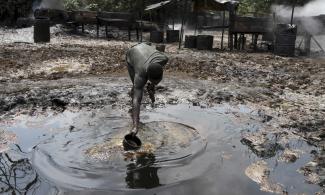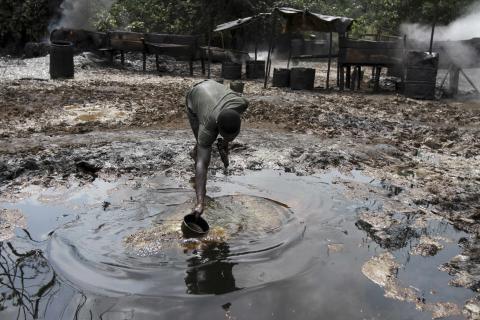
The federal government - executive and legislature - should know that the singular passage of the PIGB will not deliver the full benefits of the intended reforms unless other aspects of the Petroleum Industry Bill are concurrently legislated in order to address the concerns of the oil host communities.
There is no doubt that the recent passage of the Petroleum Industry Governance Bill (PIGB), a fragment of the original legislation by the Senate, was a milestone in the nation’s efforts at reforming the way its oil and gas sector is administered. However, this piece of legislation, passed by the Senate last week, is only geared at sanitising governance processes and activities in the nation’s oil and gas sector. Now, whether this is going to produce the desired enabling operating environment for a smooth, peaceful and transparent management of our oil business is still blurred, and at worst, obscured.
The National Assembly, in its wisdom, believed that the PIGB as originally packaged was too ambiguous and decided to break the document into bits and pieces to make it more manageable and effective. And apart from content issues with prior versions, one of the major drawbacks to its passage, as claimed by the lawmakers, was its bogus packaging as a single legal instrument.
As a result, the original document was split into four smaller bits: Petroleum Industry (Governance and Institutional Framework) Bill; Petroleum Industry (Fiscal framework and Reforms) Bill; Petroleum Industry (Upstream and Downstream Administration Reforms) Bill; and Petroleum Industry (Revenue Allocation and Management Reforms) Bill.
Interestingly, the leaked document of the fragmented bill reveals a great deal about the thinking of the Nigerian Senate on issues at the core of the Niger Delta agitation. The piece of legislation passed by the Senate as PIGB was only one-quarter of the total documents begging for the attention of the National Assembly, and making the age-long concerns of host communities a non-priority in the course of legislative action will only end up making the entire idea of reforms in the sector an exercise in futility. Mark my words!
The federal government - executive and legislature - should know that the singular passage of the PIGB will not deliver the full benefits of the intended reforms unless other aspects of the Petroleum Industry Bill are concurrently legislated in order to address the concerns of the oil host communities. Already, several ethnic nationality groups in the Niger Delta, including the Ijaw Youth Council (IYC) and Ijaw National Congress (INC) amongst others, have expressed disaffection with the Senate on the issues relating to the host communities, which they noted, were not addressed. No doubt the Niger Delta may not actually be blamed for perceiving the action by the National Assembly especially the Senate on the passage of the stand-alone PIGB as being “insensitive to the plight and concerns of the host communities.”
Is anybody still pretending not to know that one of the major challenges facing the petroleum industry in this country is the host communities and Niger Delta issues? How do you then reconcile the fact that in the four resultant pieces of the original Petroleum Industry Bill (PIB), no single mention was specifically made of the “Host Community Fund” as initially agreed though it is assumed that the fourth bill (Revenue Allocation and Management Bill) may address issues of the funds for the development of oil producing communities?
Curiously also, the perceived mischief in all these is that the Revenue Allocation and Management Bill, which is believed should address issues of the host communities’ fund, was deliberately placed as the last of the bits of documents to be discussed by the Senate. And whether they are right or wrong, some concerned people of the Niger Delta are believing that the logic is to serve the controversial consideration of the interests of oil field communities last with the hope that the hurdle will never be reached within the life of this government or that the controversy would have died of its own accord by such a time.
If the interests of the agitating people of the oil producing communities are not protected, or rather, guaranteed, by whatever reforms are carried out by the government, how can one expect to have a smooth and conducive operational environment to provide a workable and transparent governance of the industry?
As already declared by the Ijaw Youth Council (IYC) and other youth groups in the oil producing communities, “It must be stated that for oil and gas related activities to operate smoothly within the Niger Delta region, the National Assembly saddled with the responsibility of law-making should immediately take further steps for the quick passage of the Host Community Bill.”
Whether anybody wants to hear this or not, the Niger Delta people are already seeing the recent passage of the PIGB as a calculated move aimed at making laws for the smooth governance of exploitation and exploration of the abundant oil reserve within the region without any consideration of the interests of host communities that have been criminally battered by years of deliberate marginalization and neglect by the federal government in addition to the devastating effects of the continued irresponsible operational practices of the oil companies.
Though it may be wrong to believe that the singling out of the PIGB to be passed first was a calculated move aimed at making laws for the smooth governance of exploitation and exploration of the Niger Delta region against the interest of the people, as affirmed by the Youth Council, the National Assembly should know, if they want to be sincere to themselves, that to calm frayed nerves and ensure peace and hitch-free oil operation in the Niger Delta, the bit that addresses the issue of the proposed special funds for the development of oil producing communities must be taken up immediately with the urgency it deserves.
It will be a costly mistake to allow the people of the region go with the impression that the only interest the federal government has in the Niger Delta is just for the absolute control of the oil and gas resources in the region. And this will be very counterproductive especially now that the people seem to be cooperating and expecting the government to show sincerity and commitment in the development of the devastated region.
God bless Nigeria!
Ifeanyi Izeze writes from Abuja. You can reach him at [email protected].
